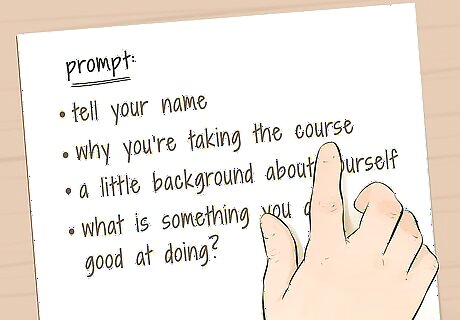
views
Speak clearly and loudly when you say your name in a class.

Now that you’ve made it to college, you’ll be meeting professors and students. Everyone is probably a little anxious to be up in front of a new class at college, so remember that it's alright to feel nervous. Instead of speaking quickly and quietly, speak loud enough for everyone in the classroom to hear you and ensure that your words are understandable. For example, instead of looking at the floor and murmuring your name, look around the room at classmates and say your name in an assertive voice. It's also important to make eye contact while you speak. This will make you appear more confident and self-assured, even if you don't feel it!
Tell the class something memorable about yourself.

This will make people remember something about you, even if they forget your name. Think of something that’s really unique and interesting to grab peoples’ attention. Try to set yourself apart from classmates who just give basic information about themselves in their intros. For example, you might say, "Hi, I'm Raj and I taught scuba diving over the summer." You could then tell a funny story from teaching the class if you have enough time. You could also tell your class where you're from and something interesting about the place. For example, if you’re from Roswell, New Mexico, say you’re from the UFO capital of the world!
Explain your academic interests so others know why you’re there.

This can help you connect with students who have similar interests. If you're in an introductory course, you'll probably have classmates who are majoring in different subjects. Briefly tell the class what you'd like to focus on academically and what you're hoping to do with your degree. You could say, "I've always loved to write and I'm interested in current events, so I'm a journalism major." If you don't know what you're going to major in yet, don't worry! You can tell the class that you're undecided or just mention a few courses you're taking this term.
Mention some hobbies and interests to make friends.

Remember that everybody here is new and looking for potential friends. This is a good opportunity to mention a unique hobby or interest you have in case others in the class share your interests. Someone might decide they want to get to know you more and come up to you after class! For example, you could say, “I love to rock climb and I’ve heard there are some good spots nearby. If anyone wants to partner up and go climbing, let me know after class!”
Practice your brief introduction speech before college starts.

That way, you won’t feel too put-on-the-spot. Run through your introduction at home before you get in front of your class. Try speaking before a mirror so you can watch your expressions and go through the speech at least once or twice so you feel comfortable with what you're going to say. If it helps, ask a friend or family member to watch you speak. They can give you useful feedback or offer encouragement. Try to limit your introductions to under 1 minute long. You probably won’t get a lot of time to talk when you introduce yourself in classes, so this helps ensure you can fit in everything you want to say.
Follow the instructor's prompts for intros in online courses.

Your instructor will probably ask you to make an introductory post on the class board. They may instruct you to tell others your name and why you're taking the course, for example. You might be asked to give a little background too. Read through the prompt carefully and spend some time giving a thoughtful response. It might be tempting to rush through the introductory post and reply with vague basics, but remember that taking the time to make thoughtful posts will make you feel more invested in the course.
Share personal and professional details in your online intro.

These details help others form a first impression of you. Since you won't be able to interact in person, try to make your introduction interesting and unique so your classmates get a sense of who you are. You could tell the class where you're from or what type of career you want, for instance. You might say, "I'm Alex and I took a few years off of school to start my own photography business. Unfortunately, I'm a great photographer, but not such a great business person. I'm hoping to learn some financial tips from this course for running my own business."
Upload a picture if you want online classmates to see your face.

Although it may not be required, consider updating your profile with a picture of yourself. Being able to show what you look like and see what your classmates' appearances can create a sense of community for the course. If you’re doing a mix of in-person and online courses, you might get recognized on campus and grab a coffee with someone from your class, too! If you don't feel comfortable uploading a picture of yourself, you should be able to select an image or avatar that represents your interests. You might need to upload a video introduction too. If so, write a brief introduction as though you were going to give it in person. Practice before filming and uploading the video.
Respond to a classmate's introduction online to break the ice.

Online courses can feel impersonal sometimes. So, take a few minutes to comment on someone else's introduction. This will foster a friendly atmosphere for the course and will help you build relationships with your classmates, which can be handy when it's time to study for exams or share notes. For example, you might reply to a classmate's introduction by saying, "Hi, Zara, it's great to meet you. I'm also a math major so maybe we'll be in other classes together!"
Get involved on campus to meet people outside of class.

Joining a club, a team, or any organization is a great way to meet people. Many on-campus clubs and organizations hold open houses and meet and greets. Check information boards or search on your school’s website for information about different events, attend them, and introduce yourself to other students there to get to know people with similar interests. For example, if you’re into sports, you could look for an intramural soccer team or dodgeball team to join. Other ways you can get involved and meet others on campus include getting an on-campus job, doing research with a professor, or finding an internship.
Say hi to people you see around the dorms or on campus.

Being friendly and greeting people you see around can help you get to know others. Spend time in common areas like study rooms and introduce yourself to people you run into there. Say hi to people who live on your floor in the dorm or who you see walking around. You might spark up a conversation and make new friends! It’s fine if not everyone you say hi to turns into a friend or even an acquaintance, but putting yourself out there helps people get to know you as well and lets them know you might be open to talking or hanging out.
Invite people to study or hang out if they seem interesting to you.

Spending time with others outside of class is a great way to form friendships. Ask someone from your class to study for an upcoming test or invite someone from your dorm to grab lunch one day. Chances are other new students are looking to get to know people and make friends too! You could even try to form a study group for a class or find a group of people who like to do the same activities to hang out with multiple new people.
Introduce yourself confidently if you have a college interview.

Before you get into college, you might have to briefly talk to an admissions officer. You may be called over to an interviewer's table or they may come over to where you're sitting. If this is the case, stand up and firmly shake their hand. Then, clearly tell them your name and take a seat when they offer it. Make eye contact and smile so you appear self-assured, even if you feel a little nervous! A lot of interviewers will start things off by asking you to tell them about yourself. Keep things conversational while you let them know a few key facts about where you're from, your educational background, or jobs that you've had. Remember to thank the interviewer for their time before leaving.




















Comments
0 comment